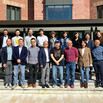Jamie Horsley in Workshops Promoting Improved Government Information Disclosure in China
Six years after China’s first nationwide freedom of information statute went into force, The China Law Center remains engaged in promoting increased freedom of information in China, working with government partners, academics and nongovernmental organizations to support ever greater use and more effective implementation of the State Council Open Government Information (OGI) Regulations. The Center’s Executive Director Jamie Horsley held a series of roundtables on March 25-26 in Beijing concerning issues arising under and revision of the OGI Regulations and a scholars draft of a more authoritative OGI Law, with partner professors Wang Jingbo of China University of Politics and Law and Wang Xixin of Peking University Law School. Proactively disclosed information and OGI requests are proliferating, and Chinese courts and administrative agencies are handling an ever-increasing load of OGI-related disputes. Many Chinese advocates suggest some of the current problems with requesting government information result from the lack of a disclosure law on a par legislatively with conflicting laws like China’s over-reaching State Secrets and Archives Laws, which emphasize secrecy rather than transparency.
On March 25, Professor Wang Jingbo brought together 40 central and local government officials, judges, lawyers and academics with Professor Wang and her team of graduate students to discuss issues relating to implementation of the OGI Regulations over the past six years and suggestions for revision of the Regulations or drafting of an OGI Law. Horsley was joined by U.S. Department of Justice Office of Information Policy Director Melanie Pustay and Connecticut freedom of information (FOI) advocate and past Executive Director of the CT FOI Commission Mitch Pearlman to provide some comparative perspective of international trends and ratings of “right to information” regimes including China and the U.S.; the scope and application of exemptions from disclosure, which continues to be a source of confusion and the basis of many disputes under China’s OGI Regulations; and various FOI enforcement models around the world. Professor Wang introduced her team’s conclusions regarding major issues in implementing the OGI regime and their drafting of a proposed Scholars Draft OGI Law to address them, and invited participant analyses of OGI implementation and comments on the proposed Draft OGI Law. The intense and occasionally spirited discussion covered the proper use or “abuse” of the OGI Regulations, the challenges facing requesters and the government officials who must carry out the OGI mandate, and workable dispute resolution mechanisms.
Judges and government officials raised the question of “abuse” of the OGI Regulations by requesters who seek information not for its own value but to use in other lawsuits or advocacy, such as lawyers representing clients in land takings or urban redevelopment cases, and whether such uses are consistent with the original intent behind the OGI Regulations. Chinese lawyers who had handled many OGI requests (one reported his law firm had filed 7,000 OGI requests in 2013 alone) and disputes contested this interpretation, arguing that needing to formally request such information is a legitimate but transitional phenomenon and that over time such information should become available through normal channels without the need for formal information requests and lawsuits to compel disclosure, and thus lessen the burden on agencies and the courts. Another frequent complaint on the “supply side” was how to deal with “historical information” created prior to the OGI Regulations—some is simply hard to locate, other information is still sensitive although it may not fall within a specific exemption—and the response that “the information doesn’t exist.” This latter response has, according to some Chinese experts, become the most common reason given by officials for non-disclosure of requested information. The U.S. participants were able contribute to the debates with comparative experience.
We then met on March 26 with Professor Wang Jingbo and her drafting team to discuss the Scholars Draft OGI Law in more detail. Participants from the National People’s Congress Legislative Affairs Commission, the Beijing Government Legal Affairs Office, the National Academy of Governance and a few other academics also joined in the interactive discussion. The U.S. side promised to provide additional written comments on the Draft, which Professor Wang continues to promote through the media as well as other channels. That afternoon, the U.S. team went to PKU for a roundtable with Professor Wang Xixin, some of his colleagues, government officials, lawyers, other academics and reporters for another lively discussion, focusing on specific OGI/FOI dispute resolution mechanisms and suggestions.
This issue-oriented and multi-faceted series of conversations about freedom of information issues helped to promote deeper understanding of and hopefully some new thinking about China’s transparency trajectory. Using these workshops as a platform to bring together practicing lawyers and journalists with government officials, judges and influential academics also produced illuminating exchanges and useful reporting in the Legal Daily and other newspapers, which continue to quote both Professors Wang and refer to the Scholars Draft OGI Law as news about OGI cases and other developments arise.


